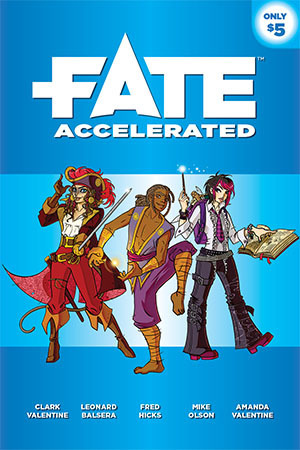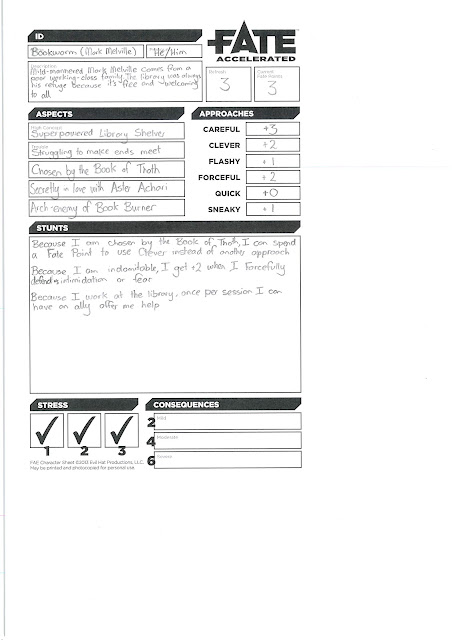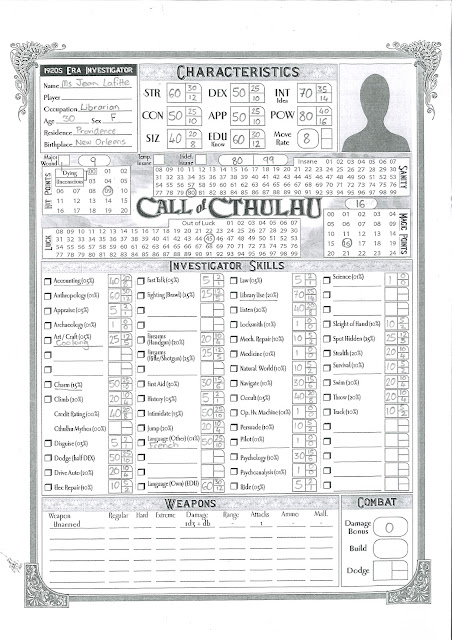Every time I pick up Castle Falkenstein, I love it a little bit more!
Castle Falkenstein (written by Mike Pondsmith in 1994) purports to be the diaries and notes of Tom Olam, a game designer who vanished years earlier. The first half of the core rulebook is the story of how he was magically kidnapped to an alternate-reality 19th century. He has various adventures as he restores the true Prince to the throne of Bayern, fights the nefarious agents of Otto Von Bismarck, woos a beautiful adventuress, and saves New Europa from Prussian conquest. There are also frequent digressions which explore aspects of the world. Normally I'm not a huge fan of fiction in game texts, but this is very charming and serves as a very good example of play. This section is also fully in colour, in a time when this was not commonplace, so it was quite lush!
The second half of the book is also in character, and it's Tom saying how he invented an RPG for his new 19th Century friends as a parlor game. As a result it's a bit different from traditional RPGs. Dice are considered vulgar, so it uses a regular deck of playing cards instead. Abilities are descriptive rather than numerical, which feels more natural - so you can be an Extraordinary Fighter, and you can play a card to temporarily do better than you usually could. There are no character sheets, because data entry forms aren't a thing yet, so instead you have a character journal. This is why the first half of the book being a story was so appropriate! I also love that there's a note saying, "If you're nervous about journalling because you're a bad writer, so were most 19th century diarists and it didn't stop them!" And then there's special rules for magic, sword duels, inventing crazy devices.
I also love the setting. It's a very early steampunk fantasy in a world where everything is a bit better brighter and happier than our world. Unlike a lot of steampunk, it focuses on Bayern rather than Britain, and it's a lot more romantic and swashbuckling. Also there's magic, fairies, dragons, dwarves, Sherlock Holmes, Emperor Norton I of the Bear Flag Republic, Pushmi-Pullyus, the Nautilus and Captain Nemo, and all sorts of other fun. For years I've wanted to write up New Zealand, where I'm from, for Castle Falkenstein - a New Zealand where history went better and indigenous rights were respected.
Character Creation: So, so easy. There's a list of 29 different character archetypes, with more in supplements. Pick one of them - or don't! They're just suggestions with a few skills that might be useful, some possessions you might have and some ideas for the sort of things you might write in your journal. I decided to roll for which template I'd use and got an Anarchist. Interesting! But there's something very Suzie Izzard about going up to someone and saying, "Hello, I'm an anarchist!" I felt like I'd need a cover identity, so I rolled again and got a Dashing Hussar. Perfect!
I need to pick one skill I'm Great at and four I'm Good at, as well as one at which I'm Poor. As it happens, there's five recommended skills between Dashing Hussar and Anarchist, one repeating. So I'm Great at Marksmanship and Good at Athletics, Charisma, Education and Fencing. Looking at the other skills, I decided to be Poor at Sorcery. No sixth sense or déjà vu for me!
And apart from that, there's a whole list of questions to answer, including such excellent genre-appropriate choices as "Who is your Nemesis?" But I'll answer them in the appropriate format, along with extra capitalization for emphasis. No promises about the prose style, but then that's rather the point! In the diary entry below, you'll find answers to all the character generation questions, as well as all my skills, which I underlined for clarity.
Image: Hussar of the Magdeburg Hussar Commando (1763, drawing from Richard Knötel, Uniformenkunde, 1893.) Sourced from Wikipedia.
I am driven, in this year of Our Lord 18--, to put pen to Paper so that I may address some of the peculiar Circumstances that have befallen my life. My name is Captain Oskar von Auerbach, and it was my honour to be a dashing member of the 117th Hussars of Bayern. However, my Troubles began when I was drawn to the Philosophy of Marx, and secretly aspired to Anarchy, and to topple the tyrants of Europa so that the Working Man may rise, all in the name of the Principle of Equality.
My upbringing was not an exceptional one, as I spent my Boyhood in my family's home on the outskirts of München. I was the youngest of five, from a Family renowned for its military service. Even as a boy I was renowned for my resolute and determined Nature, although I also suffered from the Vice of Obstinacy. When I grew to be a Man I defied my family's wishes and travelled to University, there gaining a Good Education. It was there that I met my sweet Angelika. It was She who first introduced me to Marx and opened my Mind to the Oppression of the Working Classes. Although I am now Bereft, I still treasure the last Letter which she sent me.
Upon finishing my Studies, I found myself a Man at loose ends, and surrounded by friends who felt likewise. I have always possessed a Good Charisma. Those who knew me described me as Square-Jawed and Intense, with a healthy Physique, and a Serious and Dour Personality, even Gloomy. Some of my friends now meddled with spiritualism, but even as I tried it I discovered I was Poor at Magic. At this juncture I Yielded to the pressure of my family and joined the Army, swiftly earning my Commission. I became Good at Fencing and Athletics, and Great at Marksmanship. I cut a fine figure in my uniform, as did my trusted Friend Hans Ritter, who likewise joined with me. However, I retain a love for books and Scholarship, even as I detest Dishonesty, even that which men call 'Tact.'
My unit served with Distinction during the Invasion of the dastardly Prussians, and my fellows became as Brothers to me. It was during the Fighting that I first crossed sabers with a Certain Hussar Captain of Prussia - of whom more later. My greatest Deed was my role in the Battle of Konigsberg, where we broke the Prussian invasion.
Following the Battle, I received a Strange Letter from Angelika, and learnt that she had perished. Now I found myself Torn between serving my Prince and Country, and the Principles which had douibtless led to her Untimely Death. So I forewent further Promotion, which I had long sought, and begged leave to Uncover the Truth and maybe strike some Blow for the Revolution as well...
Final Thoughts: Love it. Castle Falkenstein is perfect. It's another one I've never played (how?! why?!) but I have finally tracked down all the books, and it's such a fantastic game in a fantastic world. Creating a character was a blast. This game is an unappreciated gem. It desperately wants a new edition, just to reintroduce it to the world.






























